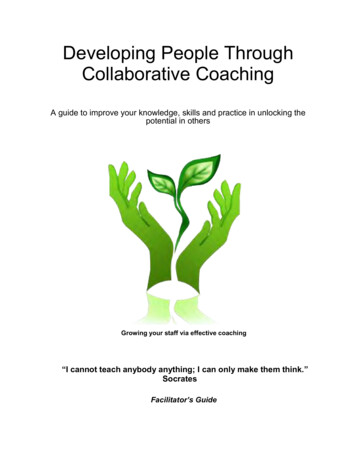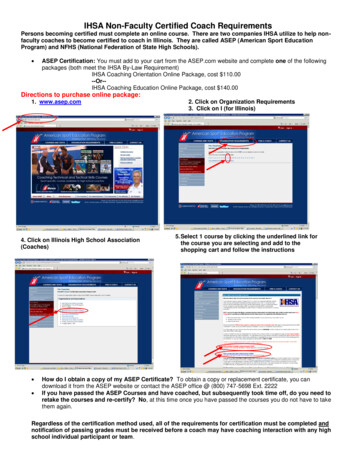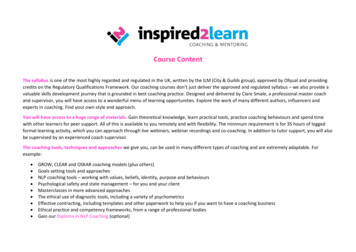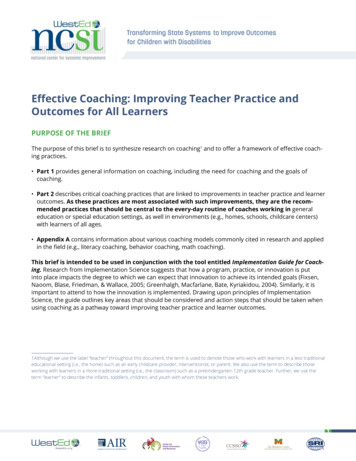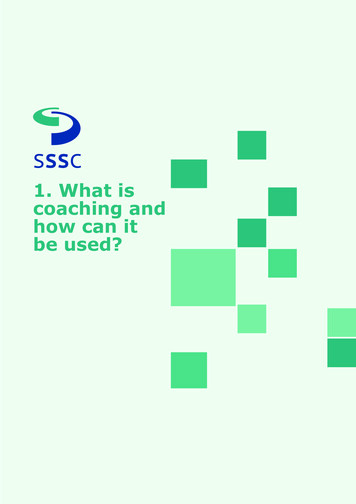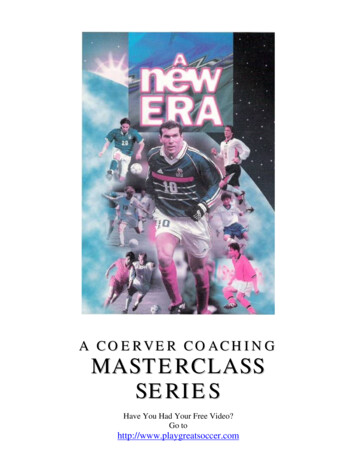
Transcription
A CO E RVE R CO ACH I N GM A ST E R C L A SSSE R I E SHave You Had Your Free Video?Go tohttp://www.playgreatsoccer.com
ALFRED GALUSTIAN CHARLIE COOKEInternational DirectorOf Coerver CoachingAlfred Galustian has been responSible for establishing the CoerverCoaching programs in Europe, NorthAmerica, Australia, Africa and Asia.Galustian began his soccer career asA player with Wimbledon. Today, he worksAs a technical coach and instructor withSeveral National Associations includingThe French National Federation and has alsoBeen involved as a technical instructor withThe youth development programs of manyProfessional clubs around the world,Including Bayern Munich (Germany),Arsenal and Newcastle United (England),Auxerre and Olympique Marseille (France)Indoor and professional clubs in Japan andKorea. Soccer League.In addition, Galustian has worked with theAmerica,Irish World Cup team, the U.S. Women sNational Team and the Chinese FootballSoccerAssociation, as well as in Brazil and AfricaHe is an international representative forSpecial Olympics.Director of Coerver Coaching(North America)Charlie Cooke made 360 leagueand cup appearances for England sPremier League club, Chelsea FC. HePlayed in three F.A. Cup finals andWas on the team that beat RealMadrid to win the European CupWinner s Cup in 1971.Cooke represented Scotland in international matches 16 times and in1969 was selected as one of the bestplayers in the world for the World AllStar Team. He also played for the LosAngeles Aztecs, Memphis Rogues andCalifornia Surf of the North AmericanSoccer League and was head coach ofthe Wichita Wings of the MajorCooke has written for SoccerSoccer Jr. and Shoot magazines,produced the video Play Like ALegend and appeared as a TV analyst.Cooke heads a U.S. nationwideNetwork of Coerver Coaching SoccerSchools and camps that he hasEstabilished in 21 states.Have You Had Your Free Video?Go tohttp://www.playgreatsoccer.com
FOREWORDThere are two important things that coaches, players and their parentsmust remember. First, good soccer teaching is essential at all times butespecially when players are in their formative years between 8 and 15.Second, all players regardless of their ability can always improvewith good practice.I think COERVER COACHING providessuperb programs for improving youngplayers. The better the individuals on ateam become, the more the team canachieve.COERVER COACHING is not onlyeffective it makes practice fun, too.Enjoyment is, of course, a key element intraining youth players. I recommend thisprogram to all young players and theircoaches.Franz BeckenbauerFranz Beckenbauer is president of BayernMunich. He is one of the greatest playersof all time. He is the only man to captainand coach his country (Germany) to WorldCup victories (1972 as captain and 1990 ashead coach).I t h in k CO E RVE R CO ACH I N GP r o vid es Su p er b p r o gr am sWh ich I r eco m m en d T o allyo u n g p layer s An d t h eir co ac h es .Have You Had Your Free Video?Go tohttp://www.playgreatsoccer.com
WHAT ISCOERVER COACHING?Wiel Coerver, the great Dutch coach, is a soccervisionary. His ideas have had a profound influenceon how soccer is taught around the world. In the1970s he pioneered innovative skill-developmentprograms for young players and devised new ways toteach soccer skills. Coerver s early focus on teachingball mastery and 1 v 1 skills by having playersemulate the moves of great players has beenexpanded to a program encompassing all aspects ofindividual and group attacking play.In 1985 Coerver was joined by Alfred Galustian,who now heads Coerver Coaching internationally,and former Scottish international star Charlie Cooke,director of Coerver Coaching for North and SouthAmerica. Galustian has carefully selected regionaldirectors to supervise the demand for CoerverCoaching programs around the world.As a result, Coerver Coaching and its global networkof soccer schools, camps and educational productshas become one of most respected soccer teachingprograms in the world.Back (I to r): Alfred GalustIan,Wiel Coerver, Tom Byer(Regional Director, Asia).Front (I to r): CharlieCooke,Martin Clark (RegionalDirector, Europe).Coerver Coaching s curriculum concentrates onimproving individual skills and small-group play,especially in the formative years. It is based on thepremise that team play consists of sequences ofinteraction between two, three or four players invarious parts of the field. When linked together (or,just as often, broken up), these small-groupsequences make up the game.Coerver Coaching is based on the fundamental beliefthat any system or team is only as good as theindividuals that form it. The essence of the Coervermethod is ball mastery. All other aspects of the gamefrom receiving and passing to group play flowfrom that basic building block.Have You Had Your Free Video?Go tohttp://www.playgreatsoccer.com
PYRAMID OFPLAYER DEVELOPMENTThe Building BlocksBALL MASTERY:Exercises where each playerworks alone with a ball atrepetitions using both feet.RECEIVING &PASSING:Exercise to improve aplayer s first touch, soimportant at all levels, and toencourage and teach accurateand creative passing.MOVES (1 V 1 ): Exercisesand games that teach gamewinning individual movesthat can create space againstthe most packed of defenses.Our new curriculum is represented by the Pyramid of PlayerDevelopment. It consists of six building blocks. Each blockhas dozens of exercises and games associated with it, manyof which have been selected for this book and thecompanion Coerver Coaching A New Era video series.The exercises and games can be used by coachers to plantheir team practices (see our Practice Planner on page 9) orby players who are trying to improve on their own.Ball mastery is the foundation of player development and isessential for progress in the other building blocks. But don tthink of the Pyramid as a ladder where one level must bemastered before proceeding to the next rung. Instead, eachbuilding block is integral to the others. Overall playerprogress is achieved as the skills and techniques describedwithin each building block become stronger.SPEED: Exercises andgames that improveacceleration, running withand without the ball andchange of pace.FINISHING: Exercisesand games that teachtechnique and encourageinstinctive play.GROUP ATTACK:Exercises and games thatimprove small-groupcombination play withemphasis on fast breakattacks.Have You Had Your Free Video?Go tohttp://www.playgreatsoccer.com
HOW TO USE THIS BOOKPLAYERS:If you are a player and you want to improve yourGame, select exercises and games from the book and try them.For the games that involve several players, enlist your friends orteammates.COACHES:If you are a coach, consider our Coerver CoachingPractice Planner ( opposite page ) when planning yourpractices. The pie chart is an easy way to structure your youthpractices.Key to SymbolsThroughout this book, you willfind exercises and games aroundwhich you can plan your teampractice sessions.The symbols, shown below, willhelp you understand the actionsthat are required. For a betterunderstanding, refer to theappropriate Coerver Coachingvideo (see Video Links to makefinding the drill easier).The chart shown is based on a 75-minute session for youthplayers (8-15 years old). If you run longer or shorter practicesessions, you can apply roughly the same ratios for each section.You may also adjust the contents of your practice to the abilitiesand fitness level of your players by graduating competition,intensity, speed and distances. For players less than 8 years old,the majority of your practice sessions should be spent in fun,small-sided games that reinforce one of the building blocks.Select exercises from sections of the pie chart for your practicesession. For example, use the ball mastery exercises in the warmup section. Each exercise will show you the setup, necessaryequipment, instructions, rules and tips and each can bevaried according to your needs. We have given some examplesof possible variations.The Video Links provided with each of the exercises will giveyou the video volume number, building block section andexercise number where you can see this book s exercises onvideo. We have included variations to some of the Videoexercises to give you more options.In addition, we have selected 13 international stars as greatexponents of the building blocks of our curriculum. We believethat young players are inspired by their heroes and will beencouraged to emulate their actions. These players arewonderfully gifted but still continue to practice and improvetheir skills; they have the qualities and attitudes that we wish allour young players to aspire to.Have You Had Your Free Video?Go tohttp://www.playgreatsoccer.comThe brand-new CoerverCoaching video series:A N ew Era .
COERVER PRACTICE PLANNERUSING THE PRACTICE PLANNER:Begin practices with a brief summary of current team status (injuries, previous gameperformance, league position, last practice, special announcements, etc.,).Let your enthusiasm spill over to your players. Then include the following sections:Section 1: Warm-up and individual ball workWarm up with gentle stretching. Then use the exercises that are featured in the ball masterysection of the book and /or video series.sSection 2: Play a gameCoaches ChecklistFollow the warm-up with a game to create a positiveworking atmosphere and attitude for the duration of Keep your goals in mind as youthe session. The games can be 4 v 4, 5 v 5, 5 v 2 orapproach each practice. Theany fun game that you want to introduce.Coerver philosophy is to keep theenjoyment and improvement of allSection 3: Train for Speedthe players as the first priority,You can use any of the exercises in the speed setion regardless of their individualof this book and/or video series.abilities. Strive to improve skills,encourage creativity and establishan attacking mentality.Have You Had Your Free Video?Go tohttp://www.playgreatsoccer.com
Section 4: Feature a skill (Topic)Select one or more exercises from the Receiving &Passing or Moves (1 v 1 ) building blocks of thePyramid. Introduce the skill in a no-pressurecontext. Gradually increase pressure until you havereached a full-pressure situation. Don t get stuck onno-pressure practice for long.Note: We have not included heading exercises. Inour programs we do not start with heading until theplayers are at least 10 years old. And up to 13 yearsof age, we only spend a small amount of time onbasic heading techniques. While heading is animportant part of the game, it has as much to dowith timing, confidence, courage and experience as itdoes with technique. If you include heading do notmake exercises long.Nor have we included special drills on defendingalthough it can also be made into a practicetopic. At our camps, schools, and clinics we coverdefense during our small-sided games. Many of theindividual qualities needed for good defending arebyproducts of some of our technical skills. Learningthe moves, for example, will improve a player scoordination, flexibility and quickness and will,above all, provide valuable practice in 1 v 1 duels. Allof these will improve individual defending skills.Section 5: Focus on individual and groupfinishingYou can use any of the exercises featured in thefinishing, group combinations or fast break attackchapter. Everyone enjoys shooting and it s aninvaluable team skill so Coerver Coachingincludes shooting in every session it runs. You canalso combine this portion of your practice with otherskills, such as incorporating a 1 v 1 move with thefinishing exercise you have selected.Think safety first. Always be sureyour planned activities, field,equipment and weatherconditions are safe. Goals need tobe secured firmly to the ground.Alternatively, use cones or cornerflags. Always have a first-aid kitwith you and be sure players haveconstant access to drinking water.Prepare your session before youget on the field. Make a writtenplan that can include basicdiagrams of the exercises youwant to cover and the maincoaching points you feel will helpyour players. Don t beembarrassed to make reference toyour notes during the session.Ensure that your players areproperly equipped.Recommended ball sizes are No.3for ages 5-7; No.4 for ages 8-10and No.5 for ages 11 and older.Advise players to wear cleated(studded) soccer shoes when theground is soft, turf-style shoes onhard ground and soccer trainingshoes when playing indoors. Inaddition, make sure all playerswear shinguards during practicesand matches.Your gear bag should includecones or other safe markers, andpinneys (bibs) in at least twocolors.Section 6: Play a small-sided gameSmall-sided (e.g. 3 v 3, 4 v 4 and 5 v 5) games arecrucial to encourage players to use their skills quicklyHave You Had Your Free Video?Go tohttp://www.playgreatsoccer.com
Making Your OwnPractice LogAnd spontaneously under pressure. Our goal is for playersto execute skills without hesitation or thought. You candesign your small-sided games to reinforce one of theTo help you prepare for each building blocks of the Pyramid, but the majority of thesepractice and keep a record of games should be free, fun and played at full pressure.your season, use a notebook.As we have stated, the Coerver Coaching program is anAt the top of each page,attack-oriented approach to soccer. Nevertheless, smallwrite down the date, time,sided games give you an opportunity to coach individualtemperature and fieldconditions. Then include the and team defense.following information:The 4 P s of Defense:Practice outlinePressure: Get close fast. Don t over-commit. One or twoDuration of each section yards from the opponent is good. Adjust the distanceaccording to your assessment of the opponent. Is he/shefast? Slow? Clever with the ball? Try to be close enough toEquipment neededpoke the ball away if you get the chance. Fake tackles tokeep the opponent guessing.After the practice iscomplete, make notes onPosition: Be aggressive. Stay low. Bend your knees towhat was successful andhelp you move in any direction. Angle your body to try towhat wasn t, effort byguide the opponent in the direction you would like themindividual players, playersto go.attitudes. Use the noteswhen speaking to the teamPatience: Contain. Be Patient. Stay on your feet. Don tat the start of the nextslide to the ground unless you are sure you can get thepractice or match.ball. Sneak a look for covering defenders. If you can t besure of getting the ball, be prepared to wait for help fromteammates, or for the opponent to make an error.Remember the object is to hold up your opponent or winthe ball.Physical: Be physical and determined but always be fair.Be prepared to put out a lot of energy when you defend.Section 7: Run competition sprintsAn uplifting way to end practice is with short, 20 yardsprint competitions, with or without the ball. Try to matchcompeting players evenly or to stagger the starts so allplayers are challenged.End with a short summary of directions, time, locationand special needs of the next practice/game. Thank all forattending and for their efforts.Have You Had Your Free Video?Go tohttp://www.playgreatsoccer.com
what the experts sayGERARD HOULLIERFormer Technical Director and Head Coach of France andcurrent coach of Liverpool F.C.Coerver Coaching helps us produce the kind of technicalplayers that can give our teams a winning edge. I first broughtAlfred to work with the French Federation regional coachesfour years ago, and the results and reaction since have beenexcellent.ROBERTO RIVELINOBrazilian World Cup championEvery young playr from 8 years old on should be exposed toCoerver Coaching. I am convinced of the value of this programKENNY DALGLISHFormer Liverpool and Scotland LegendThe Coerver Coaching program brings enjoyment andsatisfaction to young players and is helpful with thedevelopment of their skills.Have You Had Your Free Video?Go tohttp://www.playgreatsoccer.com
ARSENE WENGERHead Coach and Manager of ArsenalIt is essential that players 15 and under get the best teachingavailable so we can develop higher standard players for thefuture. In this regard I admire the Coerver Coaching programvery much. It s original and its emphasis on individual skillimprovement as the foundation for teaching young players is,in my view, correct. It is an important part of our youthdevelopment at Arsenal.CARLOS PARREIRACoach of 1994 Brazil World Cup ChampionsThe Coerver Coaching program teaches a variety of skills,techniques and drills which can be used effectively in matchsituations, especially to create more goal chances. Irecommend the new Coerver Coaching Video Series and bookto all youth coaches around the world, as a fundamental guideto improve and develop young players/ROY HODGSONHead Coach and ManagerOf Blackburn RoversIt gives me much pleasure to recommend this new book byAlfred Galustian and Charlie Cooke, which I am sure will fillan important gap for coaches who are seeking to improve theskill levels of young players.Have You Had Your Free Video?Go tohttp://www.playgreatsoccer.com
Wiel Coerver, the great Dutch coach, is a soccer visionary. His ideas have had a profound influence on how soccer is taught around the world. In the 1970s he pioneered innovative skill-development programs for young players and devised new ways to teach soccer skills. Coervers early focus on teaching ball mastery and 1 v 1 skills by having players



